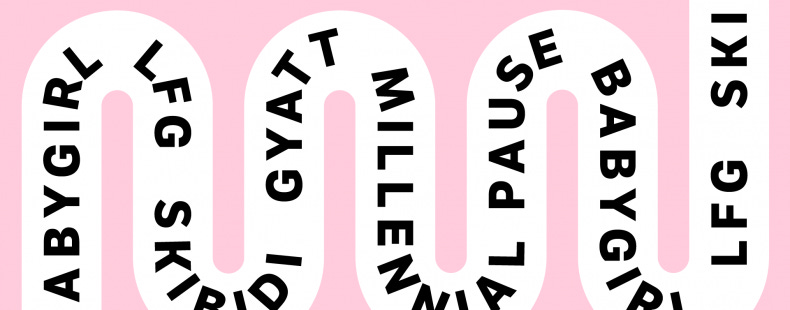And when you’re capturing the spoken word, slang is an essential part of your vocabulary!
enshittification
babygirl
skibidi
ice cream so good
millennial pause
gyatt
let them cook
LFG
tush push
delulu
stenographer
The internet keeps on supplying us with an endless stream of trendy slang words that come from anywhere—from bizarre TikTok streams and YouTube videos featuring sentient toilets—and everywhere in between.
Why are grown men called babygirl? What is the scuttlebutt on tush push and gyatt? What does it mean to be delulu? Are we doomed to a fate of enshittification? We have all of the answers to questions you may have been too scared to ask.
Content Note: As you might expect, some of these terms contain profanity.
enshittification
What it means: Enshittification is the gradual degradation of an online platform or service’s functionality, as part of a cycle in which the platform or service first offers benefits to users to attract them, then pursues more and more profits at the expense of users. You can probably guess why enshittification has become a popular word recently.
Where it comes from: Enshittification was popularized by Canadian writer Cory Doctorow, who has used the word to describe the decline in quality of platforms like Facebook, Twitter, and TikTok.
Why linguists are interested: The American Dialect Society (ADS) chose enshittification as its 2023 Word of the Year. It was described as a “sadly apt” term to describe the decline of online platforms. It also earned points for being “instantly memorable” and having the ability to be used in a wide variety of contexts.
Our lexicographers say: At Dictionary.com, we integrate slang (like enshittification) into our dictionaries to document its role in language evolution and to acknowledge its informal but significant impact. Lexicographers evaluate a slang term’s longevity and widespread use, analyzing its frequency, contexts—including internet culture and social media— and recognition by authoritative bodies, such as the ADS designation of enshittification as Word of the Year.
babygirl
What it means: Babygirl is a term of endearment that refers to attractive older male celebrities or fictional male characters. Babygirl is especially likely to be used to refer to a male that is seen as vulnerable, sensitive, cute, or submissive.
Where it comes from: Traditionally, babygirl was a term of endearment used by men to refer to women. The reversal of babygirl to refer to men may originate with a photoshopped image of the comic Mob Psycho 100 that went viral. The trend seems to have been largely motivated by the humor of referring to grown men by the cutesy term babygirl.
skibidi
What it means: Skibidi is a nonsense word or sound without a specific meaning.
Where it comes from: We promise you that the next sentence is, in fact, true. The “word” skibidi comes from the extremely popular YouTube series “Skibidi Toilet,” which features sentient toilets with human heads battling humanoids with electronic devices for heads. The series has a theme song based on a remix of the song “Dom Dom Yes Yes” by Bulgarian singer Biser King. The word skibidi is an approximation of one of the nonsensical words Biser King says during the song.
ice cream so good
What it means: Ice cream so good is a catchphrase of TikTok streamer PinkyDoll.
Where it comes from: On Tiktok Live, viewers can send money to a streamer, and the donations are represented on-screen by stickers resembling objects. Ice cream so good was TikTok user PinkyDoll’s usual response for receiving a donation represented by an ice cream cone sticker. PinkyDoll is an NPC streamer, a term that refers to a person who streams themselves acting like a robotic NPC (nonplayer character) from a video game. The phrase ice cream so good is commonly used to refer either to PinkyDoll or NPC streaming in general.
Our lexicographers say: Examples like skibidi and ice cream so good show the same hallmarks of informality, memorability, and timeliness as slang classics like booyah or keep on truckin’.
millennial pause
What it means: Millennial pause refers to a short delay before a person starts speaking when recording themselves for a video.
Where it comes from: The term millennial pause is credited to TikTok user nisipisa, who used it in a November 2021 TikTok video about singer Taylor Swift. The millennial pause results from a person quickly checking that their phone is recording before speaking. The term millennial pause is often used by younger generations to playfully accuse millennials of getting too old for the internet. A similar term is used to describe the behavior of Generation Z. The Gen Z shake is the Gen Z equivalent to the millennial pause and refers to a phone shaking as a person puts it down at the beginning of a recorded video.
gyatt
What it means: Gyatt is a slang exclamation of surprise or excitement. Gyatt is most commonly used as an exclamation in reaction to seeing a large butt (that is, the buttocks) and may be used as a noun to mean a large butt.
Where it comes from: Gyatt is an alteration of the word God in the phrase “God damn,” sometimes written as “Gyatt dayum.” The use of gyatt to refer to voluptuous women was popularized by Twitch streamer YourRAGE.
let them cook
What it means: Let them cook is a slang phrase used as a command to let a person freely do something they are good at, without interference. The phrase is used with various pronoun constructions, such as let him cook or let her cook.
Where it comes from: Let them cook and its many variations are often attributed to rapper Lil B, who has used the phrase since at least 2010. Lil B refers to himself as a “master chef” and uses the word cook in reference to his rapping prowess. The slang spread and became popular among sports fans to refer to letting an athlete play without holding them back.
LFG
What it means: LFG is an abbreviation for “let’s fucking go.” It is often used to express hype and to rally others to action.
Where it comes from: LFG is simply an abbreviation of “let’s fucking go.” This usage of LFG dates back to at least the early 2010s. The phrase let’s fucking go seems to have become more popular since the early 2020s.
tush push
What it means: The tush push is a football play in which the quarterback receives the ball and is immediately pushed from behind by teammates. It’s a version of the play known as a quarterback sneak.
Where it comes from: The tush push play was popularized by the 2022 Philadelphia Eagles, who used it with significant success to reach the Super Bowl. The tush push name became popular in sports media to refer to the play following the 2022 season as the Eagles continued to use it and other teams adopted it. The play is also commonly referred to as the Brotherly Shove due to its close association with the Eagles, who play in Philadelphia, nicknamed the City of Brotherly Love.
delulu
What it means: Delulu is a slang shortening of the word delusional. It is especially used to describe superfans or dating partners who display odd or extreme behavior.
Where it comes from: The slang delulu seems to have emerged from the Korean pop music (K-pop) fan community. As early as 2013, it was used to mock delusional fans who believed they could somehow become romantically involved with celebrities.
Learn some of the slang terms that K-pop stans (delulu or not) have contributed to language within and beyond the fandom.
stenographer
What it means: Stenographer is a term for a journalist who uncritically repeats the words of politicians and other powerful individuals.
Where it comes from: A stenographer is a person whose job it is to copy down verbatim every word said in a courtroom. The slang term stenographer has been negatively used in media criticism since at least the 2000s. It is typically used by media critics who feel that journalists should use their platform to critically analyze and factcheck the words of the powerful rather than simply repeat them. In this context, the word stenographer is negatively equating a journalist to a person who simply writes down every word they hear without checking to see if those words are true.




